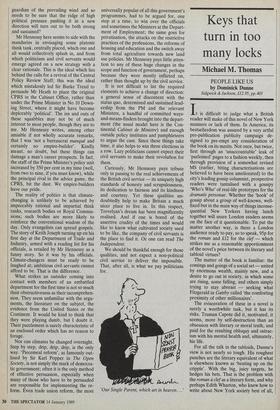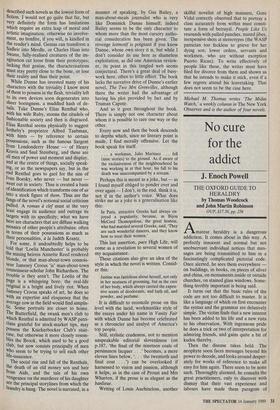Keys that turn in too many locks
Michael M. Thomas
PEOPLE LIKE US by Dominick Dunne
Sidgwick & Jackson, f12.95, pp.403
It is difficult to judge what a British reader will make of this novel of New York manners or lack of them. In America, its bestsellerdom was assured by a very artful pre-publication publicity campaign de- signed to pre-empt any consideration of the book on its merits. Not once, but twice, first through an 'unaccountable' leak of `purloined' pages to a fashion weekly, then through provision of a somewhat revised MS (earlier, biting characterisations are believed to have been ameliorated) to the city's leading gossip columnist, prospective readers were tantalised with a gossipy `Who's Who' of real-life prototypes for the dramatis personae. Whether the `hook' of gossip about a group of well-known, well- fixed but in the main way of things inconse- quential New Yorkers having lunch together will snare London readers seems on the face of it questionable. To put the matter another way, is there a London audience ready to pay, so to speak, 95p for the roman and £12 for the clef — which strikes me as a reasonable apportionment of the novel's price between its literary and tabloid virtues?
The matter of the book is familiar: the comings and goings of a social set — united by enormous wealth, mainly new, and a desire to go out in society, in which some are rising, some falling, and others simply trying to stay abreast — seeking what Fitzgerald in Gatsby called 'the comforting proximity of other millionaires'.
The evisceration of these in a novel is surely a worthwhile task, but it has its risks. Truman Capote did it, motivated, it seems, more by self-destruction than an obsession with literary or moral truth, and paid for the resulting obloquy and ostrac- ism with his mental health and, ultimately, his life.
For all the talk in the tabloids, Dunne's view is not nearly so tough. His roughest punches are the literary equivalent of what is elsewhere known as `beating up on the cripple'. With the big, juicy targets, he hedges his bets. That is the problem with the roman a clef as a literary form, and why perhaps Edith Wharton, who knew how to write about New York society best of all, described such novels as the lowest form of fiction. I would not go quite that far, but very definitely the form has limitations which require an extra leap of moral and artistic imagination; otherwise no involve- ment, no bonfire, if you will, is kindled in the reader's mind. Genius can transform a Sadleir into Merdle, or Charles Haas into Swami, fully-realised creatures of the im- agination cut loose from their prototypes; lacking that genius, the characterisations must stay pretty close to the bone, or lose their reality and thus their point.
While Dunne has invested many of his characters with the triviality I know most of them to possess in the flesh, triviality left to its own devices soon degenerates into sheer boringness, a muddled hash of de- tails. Take Dunne's Elias Renthal who, with his wife Ruby, storms the citadels of fashionable society and then is disgraced. Elias Renthal seems physically to suggest Sotheby's proprietor Alfred Taubman, with hints — by reference to certain possessions, such as the famous Sargent from Londonderry House — of Henry Kravis and Saul Steinberg, and these are all men of power and moment and display, and at the centre of things, socially speak- ing, or so the newspapers say, but in the end Renthal goes to gaol for the sins of Ivan Boesky, who never — but never went out in society. Thus is created a basis of identification which transforms one of us Into a stock figure of them. Thus are the fangs of the novel's notional social criticism pulled. A roman a clef must at the very least engage its audience and outrage its targets with its specificity; what we have here are characters that are diffuse walking mosaics of other people's attributes: often in terms of their possessions as much as their personalities, a la Judith Krantz.
For some, it undoubtedly helps to be told that loelia Manchester' is probably the mining heiress Annette Reed rendered blonde, or that man-about-town connois- seur Jamesey Crocus 'is' man-about-town connoisseur-scholar John Richardson. The trouble is they aren't. The Loelia of the Page is a whingeing bore; the real-life Original is a bright and lively riot. When Jamesey Crocus speaks of art, he does so with an expertise and eloquence that the average cow in the field would find simplis- tic. Some portraits are closer to home. The Butterfield, the swank men's club to which Renthal is admitted by WASP patri- cians grateful for stock-market tips, may Possess the Knickerbocker Club's stair- case, but otherwise it more closely resem- bles the Brook, which used to be a good club, but now consists principally of men who seem to be trying to sell each other life-insurance.
The social rise and fall of the Renthals, the death of an old money son and heir from Aids, and the tale of his own vengeance on the murderer of his daughter are the principal storylines from which the laundry is hung. The novel is narrated, in a manner of speaking, by Gus Bailey, a man-about-meals journalist who is very like Dominick Dunne himself; indeed Bailey seems to be the only character to whom more than the most cursory autho- rial consideration has been given. The revenge leitmotif is poignant if you know Dunne, whose own story it is, but while I don't consider its use here as shameless exploitation, as did one American review- er, its point in this tangled web seems conjectural. There's a great deal of busy- work here, often to little effect. The book lacks the narrative drive of Dunne's earlier novel, The Two Mrs Grenvilles, although there the writer had the advantage of having his plot provided by fact and by Truman Capote.
And so it goes throughout the book. There is simply not one character about whom it is possible to care one way or the other.
Every now and then the book descends to depths which, since no literary point is made, I find morally offensive. Let the book speak for itself.
In Paris, attractive Greeks had always en- joyed a popularity, because, as Bijou McCord Thomopolous, the great hostess, who had married several Greeks, said, 'They are such wonderful dancers, and they know how to treat their women.'
This last assertion, pace High Life, will come as a revelation to several women of my acquaintance. These citations also give an idea of the style in which the novel is written. Consid- er this:
Justine was fastidious about herself, not only in her neatness of grooming, but in the care of her body, which always carried the expen- sive scents of deodorants, and bath oil, and powder, and perfume.
It is difficult to reconcile prose on this level with the lucid, workmanlike style of the essays under his name in Vanity Fair with which Dunne has become celebrated as a chronicler and analyst of America's top people.
Still, stylistic crudeness, not to mention unspeakable editorial slovenliness (on p.187, 'the final of the nineteen coats of persimmon lacquer . . .' becomes, a mere eleven lines below, `. . . the twentieth and final coat . . .') can be overlooked if harnessed to vision and passion, although it helps, as in the case of Proust and Mrs Wharton, if the prose is as elegant as the banlieue.
Writing of Louis Auchincloss, another
. a workman, Julio Martinez . . . fell (nine stories) to the ground. As if aware of the exclusiveness of the neighbourhood he
Perhaps this is meant as a joke, but — as I found myself obliged to ponder over and over again — I don't, in the end, think it is, not if in the author's voice. What does strike me as a joke is a generalisation like this: skilful novelist of high manners, Gore Vidal correctly observed that to portray a class accurately from within must consti- tute a form of betrayal. People Like Us resounds with pulled punches, muted jibes, inexpensive shots at stereotypes (the WASP patrician too feckless to grieve for her dying son; lower orders, servants and workmen, who are without exception Puerto Rican). To write effectively of people like these, the writer must have filed for divorce from them and shown us that he intends to make it stick, even if a few regrets attend his leavetaking. That does not seem to be the case here.
Michael M. Thomas writes The Midas Watch,' a weekly column in The New York Observer and is the author of four novels.



















































 Previous page
Previous page